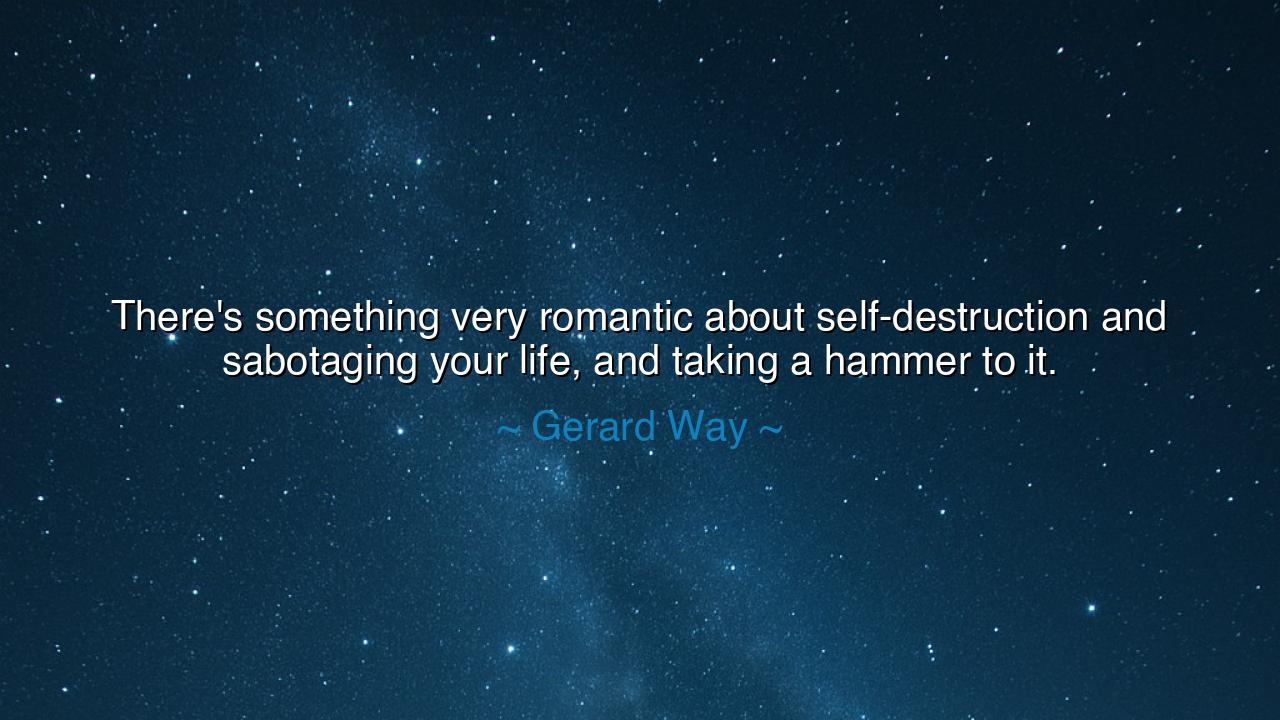
There's something very romantic about self-destruction and
There's something very romantic about self-destruction and sabotaging your life, and taking a hammer to it.






“There’s something very romantic about self-destruction and sabotaging your life, and taking a hammer to it.” So declares Gerard Way, with the raw honesty of an artist who has walked close to the edge. His words reveal a paradox that has haunted the human spirit for ages: that in ruin there is a kind of dark beauty, in collapse a twisted form of poetry. The allure of self-destruction is not found in reason, but in the heart’s craving to make pain visible, to turn suffering into a spectacle that feels almost heroic.
The ancients knew this lure well. The tale of Icarus, who flew too close to the sun despite all warnings, is not only a lesson in folly but also a symbol of reckless passion. He could have flown safely, lived long, and remained nameless. Yet it was his doomed flight, his fiery fall, that gave his name immortality. His act of sabotage against his own life became a myth, romanticized for centuries. Thus Way’s words echo through myth and history: destruction, when chosen boldly, can seem like a form of art.
There is also a defiance in this kind of ruin. To “take a hammer” to one’s life is to refuse the quiet decay of conformity, to shatter stability in an act of rebellion. In the storms of history, many have chosen such paths. Consider Cleopatra, who, rather than surrender to Rome, chose her own end by the serpent’s bite. Her self-destruction was not cowardice—it was her final act of sovereignty, remembered as fierce, defiant, and strangely beautiful. The world, though it mourns such choices, cannot help but see a kind of romance in the fire of those who refuse to bow.
Yet beneath this allure lies sorrow. For the romance of destruction is often born from despair, from hearts too wounded to see another way. Artists, poets, and visionaries throughout time—Byron, Sylvia Plath, Kurt Cobain—have embodied this tension. Their legacies glow with brilliance, but also with tragedy. We are drawn to their stories not only for their genius, but for the haunting spectacle of lives consumed by their own flame. The romance is real, but so is the devastation left behind.
The lesson, then, is not to glorify self-destruction, but to understand its appeal—and to transform it. The desire to smash what exists comes from a hunger for change, for freedom, for authenticity. If one can take that same fire and direct it not at the self, but at falsehood, oppression, and mediocrity, then destruction becomes creation. To break chains, to dismantle injustice, to burn away what is corrupt—this is the higher form of the same energy that Way describes.
So, dear listener, when you feel the pull of destruction, ask yourself: what is it I truly wish to end? Is it my life, or the prison of lies around me? Is it myself, or the walls I’ve built against my own growth? Take up the hammer, but wield it with wisdom. Do not shatter your own soul—shatter instead the barriers that keep your soul from breathing.
For in the end, Gerard Way’s confession is a mirror of human frailty and longing. The romance of ruin is real, but fleeting. The greater romance, the nobler story, is to transform destruction into rebirth. To die to the false self, and to rise stronger, freer, and truer than before. Thus the hammer need not be your end—it can be the beginning of a new creation, a life not destroyed, but remade in fire.






AAdministratorAdministrator
Welcome, honored guests. Please leave a comment, we will respond soon